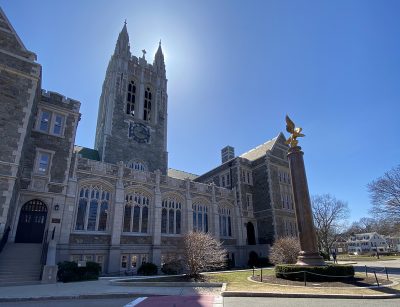As the Spring semester comes to a close, many Boston-area colleges are requiring COVID-19 vaccinations for students and faculty to return to campus next fall.

Northeastern University was the first college in Massachusetts to announce the requirement April 6. Others followed, including Boston College, the University of Massachusetts Amherst, Emerson College, Boston University and the Massachusetts state university system.
Vaccination is encouraged but not required for students at community colleges in the Commonwealth in order to provide equity and reduce barriers to education, according to a Massachusetts Association of Community Colleges statement published by The Boston Globe.
NEU’s vaccination requirement is designed to ensure fully in-person learning and campus life by the fall, according to a release from the University.
“As we plan for a return to in-person classes and regular campus activities, we know that achieving herd immunity is crucial for the safety of our entire community,” Ken Henderson, chancellor and senior vice president for learning at NEU, wrote in the release.
The COVID-19 vaccination not only significantly reduces the risk of infection, but also provides a sense of “psychological safety” for people, said Paul Beninger, associate professor of public health and community medicine at Tufts University.
“It gives confidence to the individual student that the community is a safe place,” Beninger said. “It communicates to the other people who are in that community that there is a sense of caring.”
A COVID-19 vaccination also reduces social tension and allows students to socialize without as significant a worry, Beninger said.
“It frees up time on your calendar to actually participate in some collective activity, so it’s the small groups, it’s the meal time,” he said. “You have a much higher level of comfort and assurance that you can just get together with other people without having to do a chat with the door.”
At the colleges requiring the COVID-19 vaccination, there are exceptions for legitimate medical or religious reasons. Beninger said vaccine exceptions are fine if the majority of the on-campus population is vaccinated, which will create herd immunity — with those who have been vaccinated protecting those who haven’t.
“You’re going to have 99% of the people there who are going to be conforming to whatever that campus requires,” he said. “The larger community can feel comfortable that everyone in that community has passed muster.”
Anelise Pardo, a freshman at Tufts University, said she supports the University’s vaccine requirement.
“We’ve seen this pandemic firsthand, the craziness that it’s brought, and when there’s something that’s arguably so easy that we can do to get back to normal life, I’m glad that Tufts is promoting that,” Pardo said. “They already have an idea of like, ‘anything we can do to prevent any crazy outbreak, we will do,’ and this is in line with that.”
Pardo added she has already been vaccinated, using a facility outside of Tufts — something she said is common among students. All Massachusetts residents, students and workers 16 and older are eligible to receive the vaccine as of April 19.
“Most of the people, if they want to get vaccinated, they’re definitely going to try to take the opportunity,” she said.
Beninger added there is some “flexibility” for reducing the COVID-19 safety rules on campuses when more people are vaccinated, but the situation varies based on group size.
“The larger groups and classrooms, I think there’s still going to be social distance and maybe mask-wearing,” he said. “But I think whatever the health officials in the administration decide, we’ll probably be fine.”
While there may be concern over international students returning to campus with vaccines that are not approved by the United States, Beninger said individual students should not have to worry about the situation.
“That is the responsibility of health officials in the administration,” he said. “They need to make that determination, and the students need to comply.”
Emily Stevenson and Taylor Brokesh contributed to the reporting of this article.












































































































